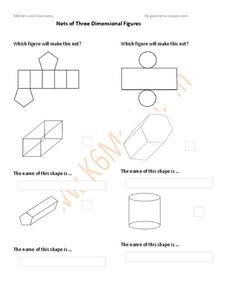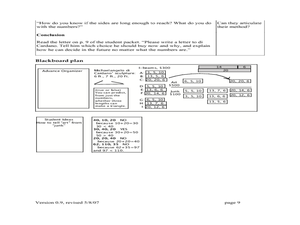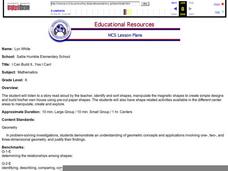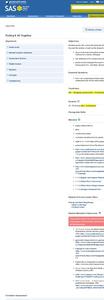Curated OER
Nets of 3-Dimensional Figures
In this nets of 3 dimensional figures worksheet, students determine which given figures will make given nets, then name a set of 4 shapes.
Curated OER
Square Corners
What type of corners does this shape have? Young geometers examine 12 shapes, circling the square corners in each if they have any. There are two examples demonstrating this concept, but be sure scholars understand the difference between...
Curated OER
Draw It!
Students follow directions to make two- and three-dimensional shapes. Focusing on polygons, they use the shapes to solve real-world problems and review with the class. They read two of Shel Silverstein's poems and discuss the...
Teach Engineering
Seeing All Sides: Orthographic Drawing
How can your draw three-dimensional figures on paper? The lesson shows pupils how to draw orthographic projections of three-dimensional figures composed of cubes. After viewing a PowerPoint presentation, they practice this skill with...
Curated OER
Soft Sculpture Birds
Art can mimic life, and animals are always interesting subjects. Learners create large soft sculptures (stuffed) birds using paper, paint, and other basic collage materials. They view images of birds, and discuss bird traits and shapes....
EngageNY
Truncated Cones
Learners examine objects and find their volumes using geometric formulas in the 21st installment of this 25-part module. Objects take the shape of truncated cones and pyramids, and individuals apply concepts of similar triangles to find...
Scholastic
Study Jams! Solid Figures
Figure out the correct name for different three-dimensional shapes by watching the presentation on solid figures. Go through the main figures and read about the characteristics of each. Finish the topic with a multiple choice online...
Curated OER
Art or Junk? Discovering the Triangle Inequality
Middle schoolers study the triangle inequality. They will identify, compare, and analyze attributes of two and three-dimensional shapes. Then they develop vocabulary to describe the attributes. They also use manipulatives to analyze the...
Curated OER
Introduction to Minerals
Students discover how crystal structures go together to create minerals. For this earth science lesson, students work in groups to create 3-dimensional shapes of crystals that they then put together in a compact structure.
Virginia Department of Education
Surface Area and Volume
Partners use materials to wrap three-dimensional objects to determine the formula for surface area. The groups use an orange to calculate the amount of peel it takes to completely cover the fruit. Using manipulatives, individuals then...
Curated OER
Branding Circles, Squares, Rectangles, Triangles
Compare and classify 2-D shapes! Kindergarteners inspect the attributes of plane shapes and examine shapes in everyday life. They label the circles, squares, rectangles, and triangles they find. This is the website where you can find the...
Curated OER
I Can Build It.....Yes I Can!
Kindergartners listen to a story read by their teacher, then use magnetic shape pieces to construct simple designes. They "build" their own house using pre-cut paper shapes. This age-appropriate lesson plan would be an excellent choice...
Alabama Learning Exchange
Twisted Tangrams
Primary geometers create a picture using tangrams. In this geometry lesson, learners read Grandfather Tang: A Tale Told with Tangrams, cut out their own tangrams, and choose a character from the story to make using their tangram pieces.
Curated OER
Tomato Exploration
Create tomatoes in 15-20 minutes using this fun and interactive lesson plan! Learners listen to a book about tomatoes (recommendations listed), and focus on the vocabulary word tomato. They count the syllables and practice the plural....
Curated OER
Copy Cat
Students examine a Webmath page, and demonstrate how to copy and paste. They create a computer-generated template page presenting the attributes of two- and three- dimensional shapes.
Curated OER
Putting It All Together
Students complete activities to learn about the shapes and their vertices. In this shape recognition instructional activity, students discover the rule linking the number of sides with the number of vertices for shapes. Students...
Curated OER
A Sphere and Its Net
Students identify and sketch the nets for sphere. In this geometry lesson, students differentiate between two and three dimensional shapes. They find the surface area of each sphere.
Futures Channel
Folding Circles
Students investigate properties of circles. In this geometry lesson, students differentiate between similarity and congruence as they observe polygons. They investigate properties of two and three dimensional shape.
National Gallery of Canada
My Abstraction
What makes a color warm, and what makes a color cool? Explore colors and abstract art through an observation activity and an art assignment. Learners look at images and talk about colors before making their own compositions with...
Curated OER
One Good Turn Deserves Another
Students make observations about shapes and 1-, 2-, and 3-dimensional objects. They conduct observations and make predictions regarding transformations of simple geometric shapes. They identify shapes that occur in household items.
Curated OER
Artistic Angles
Fifth graders explore angles by using protractors. They recognize, describe and determine the surface area and volume of three-dimensional shapes. Students recognize the right angle, acute angle, obtuse angle and vertex. They identify...
National Gallery of Canada
My Treehouse
If you could build your own treehouse, what would it look like? Using a piece of contemporary art as inspiration, learners draw their own treehouses and add geometric and organic shapes. The lesson touches on Visual Thinking Strategies...
Illustrative Mathematics
Toilet Roll
Potty humor is always a big hit with the school-age crowd, and potty algebra takes this topic to a whole new level. Here the class develops a model that connects the dimensions (radii, paper thickness, and length of paper) of a common...
Curated OER
Cutting Corners
Second graders examine two-dimensional shapes using their characteristics. In this shapes lesson, 2nd graders identify similarities and differences by using cut out shapes, diagrams, mirrors, and graphic organizers.
























